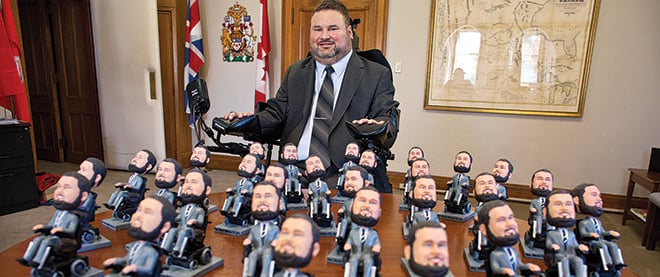Steven Fletcher and the perks of being punted from cabinet
The Manitoba MP is getting more attention than he has in years
David Kawai
Share

Being in cabinet means you’ve made it in federal politics, but getting dumped in a shuffle also has its perks. Steven Fletcher, the Conservative MP who was dropped from cabinet this summer, is arguably more prominent now as a backbench MP than he has been in years. Fletcher was at the centre of national media coverage recently, speaking in favour of legalized assisted suicide, a view not supported by the government or the opposition parties. Being dropped from cabinet has been liberating. Not only can he voice his opinions more freely, he’s had time to begin pursuing a law degree through distance education.
Oh, and then there are the bobble heads.
Fletcher, who is known on Parliament Hill for his wit, recently launched a “come bobble with me campaign,” distributing Steven Fletcher bobble-head statues to constituents to photograph while on their travels—a marketing stunt that likely wouldn’t have passed muster were he still in Prime Minister Stephen Harper’s cabinet. Fletcher says he paid for the statues out of his MP’s advertising budget, arguing they are “educational” and encourage political engagement. Mostly he did it for fun. “I may add geocaching into it as well,” he said, using the term for modern treasure hunting with a GPS and smartphone. The bobble heads have already shown up in California, across Canada and in the U.K. Last week Fletcher posted a video, shot by his five-year-old niece, of one of the bobble heads outside the set of the hit British drama Downton Abbey. “I am a fan of Downton Abbey, to my own horror. I am addicted.”
The statues are not his first attempt at unconventional promotion. A few years ago, Fletcher made trading cards of himself to give constituents. “For reasons I don’t understand,” he says, “the demand for those cards plummeted.”
Gimmicks aside, Fletcher, who became a quadriplegic at the age of 23 when his car hit a moose, is well known on Parliament Hill for his views on assisted suicide. Recently, a video appeared on YouTube of Donald Low, the microbiologist who had been the face of the SARS crisis, making a plea to change the law in Canada—a video Low made eight days before he died of a brain tumour. In its wake, Fletcher spoke out again in support of changing the laws to make assisted suicide legal, something he thinks will eventually come through court challenges. “When I had the accident, not only was I paralyzed from neck down, I could not talk,” he says. “One and a half of my lungs collapsed. I was essentially drowning.” He describes it as a form of torture he may never really recover from. “I had a lot of fight in me early on, but there was a lot of pain. I can see that if I was older and had lived most of my life and found myself in that situation with a realistic understanding of what was to come, I would definitely want the option to end my life in a peaceful and loving manner.”
He underwent further surgery two years ago after the rod in his neck became dislodged and was protruding into his esophagus. At that time, he updated his living will.
Fletcher, who is 41 and has an engineering degree and an M.B.A., has also channelled his energy into a correspondence master’s of law from the University of London in the U.K., which he began after being demoted. “I would rather have kids and those kind of worries but until then I am married to my constituents and studying law for fun,” he says.
Reflecting on being dropped from cabinet, Fletcher says it helps to put things in perspective. The Manitoba MP held two cabinet posts—minister of state for democratic reform after the 2008 election, and later minister of state for transport—but was replaced when Harper added two female MPs from Manitoba in the July shuffle. While he never saw it coming, he says, “I have been through much, much worse.” When Fletcher was dropped, he tweeted: “I am Conservative. I am a traditionalist. I wish I left cabinet in the traditional way—with a sex scandal!”
Leaving cabinet has freed Fletcher up to speak out on a range of other issues, from moose culling in Newfoundland, where the animals have caused 800 vehicle collisions, to infrastructure and energy distribution in Western Canada. That freedom is a blessing, one that politicians who lose their cabinet posts don’t always appreciate at first, says Michelle Austin, a lobbyist at Summa Strategies and former chief of staff to two Conservative cabinet ministers. “Recovering from being kicked out of cabinet usually requires detox and a rigid 12-step program,” she says. “Once you are free of the cabinet shackles, you can tackle issues that really matter to you and your career, rather than, say, unending debates on Senate reform.”
That, and send bobble heads around the world.